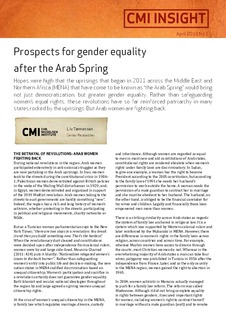| dc.contributor.author | Tønnessen, Liv | |
| dc.date.accessioned | 2018-01-04T08:18:57Z | |
| dc.date.available | 2018-01-04T08:18:57Z | |
| dc.date.issued | 2013-04-30 | |
| dc.identifier | oai:www.cmi.no:4761 | |
| dc.identifier.citation | Bergen: Chr. Michelsen Institute (CMI Insight vol. 2013 no. 1) 4 p. | |
| dc.identifier.uri | http://hdl.handle.net/11250/2474933 | |
| dc.description.abstract | Hopes were high that the uprisings that began in 2011 across the Middle East and Northern Africa (MENA) that have come to be known as “the Arab Spring” would bring not just democratization, but greater gender equality. Rather than safeguarding women’s equal rights, these revolutions have so far reinforced patriarchy in many states rocked by the uprisings. But Arab women are fighting back. | |
| dc.language.iso | eng | |
| dc.publisher | Chr. Michelsen Institute | |
| dc.relation | CMI Insight | |
| dc.relation | 2013:1 | |
| dc.relation.ispartof | CMI Insight | |
| dc.relation.ispartofseries | CMI Insight 2013:1 | |
| dc.relation.uri | https://www.cmi.no/publications/4761-marriage-is-politics | |
| dc.subject | Egypt | |
| dc.subject | Tunisia | |
| dc.title | Marriage is Politics: Prospects for Women's Equality after the Arab Spring | |
| dc.type | Report | |
